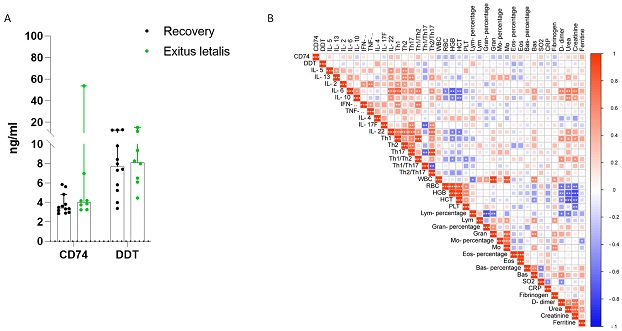COVID-19 News: The COVID-19 pandemic has posed a significant global health threat, with variable disease severity and long-term consequences in survivors. The immune response of the host is believed to play a critical role in determining the outcomes of SARS-CoV-2 infection. In this new study, an international collaboration between the Bulgarian Academy of Sciences, Military Medical Academy-Bulgaria, University of Guadalajara-Mexico, University of Messina-Italy, San Raffaele University, and University of Catania-Italy, explored the involvement of CD74 and D-DT in COVID-19 patients with diverse disease severities. The study team employed an innovative combination of in silico transcriptomic analysis and ELISA-based measurements of serum levels to investigate the potential roles of these cytokines and their receptors.
 Evaluation of CD74 and D-DT in severe COVID-19 cases. (A) Levels of serum CD74 and D-DT in recovery and lethal cases of COVID-19; (B) correlation between CD74, D-DT, serum cytokine levels and blood counts. * p < 0.05; ** p < 0.01; *** p < 0.001 by Spearman’s test
Evaluation of CD74 and D-DT in severe COVID-19 cases. (A) Levels of serum CD74 and D-DT in recovery and lethal cases of COVID-19; (B) correlation between CD74, D-DT, serum cytokine levels and blood counts. * p < 0.05; ** p < 0.01; *** p < 0.001 by Spearman’s test
COVID-19 is a complex disease with a wide range of clinical manifestations. While some individuals experience mild symptoms, others progress to severe illness and require hospitalization. Elderly patients and those with underlying medical conditions are particularly vulnerable as covered in various studies and
COVID-19 News reports. The dysregulated immunoinflammatory response to SARS-CoV-2 has been implicated in the development of severe complications. The study of cytokines involved in the immune response to the virus is crucial for understanding disease pathogenesis and identifying potential therapeutic targets.’
Macrophage migration inhibitory factor (MIF) and its homologue, D-dopachrome tautomerase (D-DT), are proinflammatory cytokines involved in various biological processes. Both MIF and D-DT bind to CD74 and other receptors to exert their effects. Previous research has suggested that MIF may play a crucial role in predicting disease severity and outcome in COVID-19 patients. However, the involvement of D-DT and its receptors in COVID-19 has not been explored until now.
In this study, the study team utilized an in-silico analysis of a publicly available transcriptomic dataset, GSE152418, to investigate MIF and D-DT expression levels in peripheral blood mononuclear cells (PBMCs) from COVID-19 patients and healthy donors. Additionally, the study team measured serum levels of MIF, D-DT, and CD74 in COVID-19 patients using enzyme-linked immunosorbent assay (ELISA). The data obtained were analyzed to assess potential correlations with disease severity and other clinical characteristics.
The study findings revealed a significant increase in MIF levels in PBMCs from COVID-19 patients, particularly those with moderate disease. This observation supports previous studies indicating the potential role of MIF in the pathogenesis of COVID-19.
Interestingly, the study team also observed a significant increase in D-DT expression levels in PBMCs from COVID-19 patients, indicating a potential involvement of D-DT in the immune response to SARS-CoV-2. However, no signi
ficant modulation of D-DT serum levels was observed, raising intriguing questions about its regulation and clearance in the blood.
Furthermore, the researchers found a concordant reduction in both serum levels and PBMCs expression levels of CD74 in COVID-19 patients, especially in those with severe disease. Notably, they also observed a negative correlation between CD74 serum levels and IL-13, a cytokine associated with disease severity in COVID-19. These findings suggest a potential role for CD74 in modulating the IL-13-mediated immune response and inflammation in COVID-19.
The intriguing similarities and differences between MIF and D-DT open up new avenues for tailored therapeutic approaches for COVID-19. However, a comprehensive understanding of their biological functions is essential before implementing such strategies. Further research is needed to fully unravel the roles of MIF and D-DT in COVID-19 and their implications in the long-term immune response to SARS-CoV-2.
The potential involvement of CD74 and D-DT in the long-term immune response to SARS-CoV-2 is particularly relevant given the emerging recognition of "Long COVID" in survivors. Understanding the interplay between these cytokines and other immune molecules involved in long-term consequences is critical for developing targeted therapies to mitigate the persistent immune response and alleviate long-term health consequences.
Conclusion
This study provides valuable insights into the roles of CD74 and D-DT in the immune response to SARS-CoV-2 infection and their potential implications for disease severity and long-term health outcomes. The findings pave the way for future research aimed at exploring novel therapeutic strategies targeting these cytokines and their receptors to improve the management and prognosis of COVID-19 patients. Further investigation into the complex immune response to SARS-CoV-2 and its modulation through MIF, D-DT, and CD74 may hold the key to addressing the challenges posed by the COVID-19 pandemic.
The study findings were published in the peer reviewed Journal of Clinical Medicine.
https://www.mdpi.com/2077-0383/12/15/5037
For the latest
COVID-19 News, keep on logging to Thailand Medical News.
